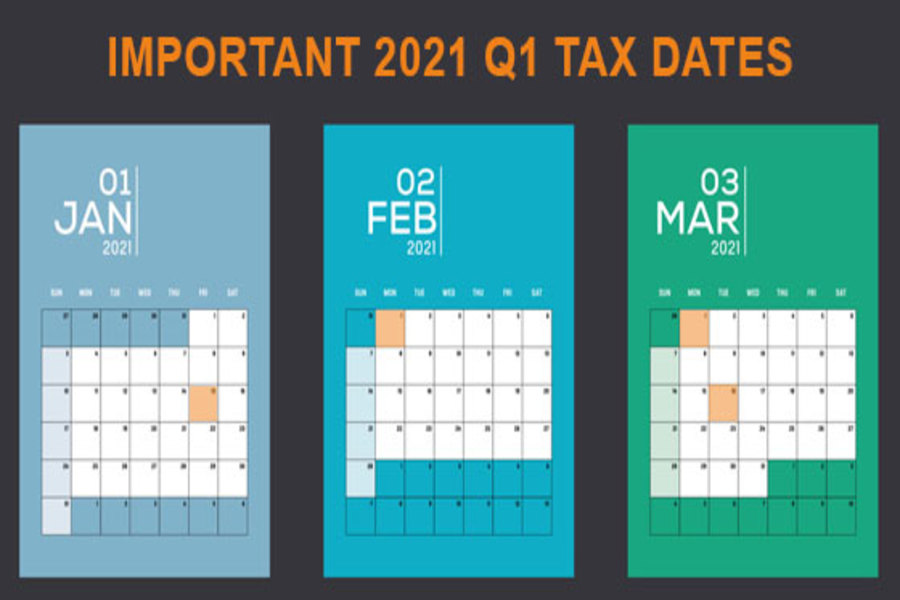The American Rescue Plan, 2021 (ARPA, 2021) was signed by President Biden on March 11, 2021 to address the continuing economic impact on employers and employees the coronavirus (COVID-19) pandemic has posed. The legislation extends and expands provisions found in the Families First Coronavirus Relief Act (FFCRA), Coronavirus Aid, Relief and Economic Security (CARES) Act, and the Consolidated Appropriations Act, 2021 (CAA, 2021). This post reviews the payroll provisions of ARPA. Paid Sick and Family Leave Credits Changes under ARPA apply to amounts paid with respect to calendar quarters beginning after March 31, 2021. ARPA, 2021: Extends the FFCRA paid sick time and paid family leave credits from March 31, 2021 through September 30, 2021. Provides that paid sick and paid family leave credits may each be...

During the COVID-19 pandemic, many people are working from home. If you’re self-employed and run your business from your home or perform certain functions there, you might qualify for home office deductions and be able to claim to expenses against your business income. There are two methods for claiming this tax break: the actual expenses method and the simplified method. Who qualifies? In general, you qualify for home office deductions if part of your home is used “regularly and exclusively” as your principal place of business. If your home isn’t your principal place of business, you may still be able to deduct home office expenses if 1) you physically meet with patients, clients or customers on your premises, or 2) you use a storage area in your home...
Merger and acquisition activity in many industries slowed during 2020 due to COVID-19. But analysts expect it to improve in 2021 as the country comes out of the pandemic. If you are considering such a transaction, it's important to understand the tax implications of buying or selling a business. Two ways to arrange a deal Under current tax law, a transaction can basically be structured in two ways: (1) Stock (or ownership interest) A buyer can directly purchase a seller’s ownership interest if the target business is operated as a C or S corporation, a partnership, or a limited liability company (LLC) that’s treated as a partnership for tax purposes. The current 21% corporate federal income tax rate makes buying the stock of a C corporation somewhat more attractive. Reasons:...
A number of tax-related limits that affect businesses are annually indexed for inflation, and many have increased for 2021. Some stayed the same due to low inflation. And the deduction for business meals has doubled for this year after a new law was enacted at the end of 2020. Here’s a rundown of those that may be important to you and your business. Social Security tax The amount of employees’ earnings that are subject to Social Security tax is capped for 2021 at $142,800 (up from $137,700 for 2020). Deductions Section 179 expensing: Limit: $1.05 million (up from $1.04 million for 2020) Phaseout: $2.62 million (up from $2.59 million) Income-based phase-out for certain limits on the Sec. 199A qualified business income deduction begins at: Married filing jointly: $329,800...
This year, the optional standard mileage rate used to calculate the deductible costs of operating an automobile for business decreased by one-and-one-half cents, to 56 cents per mile. As a result, you might claim a lower deduction for vehicle-related expenses for 2021 than you could for 2020 or 2019. This is the second year in a row that the cents-per-mile business mileage rate decreases year-over-year. Deducting actual expenses vs. cents-per-mile In general, businesses can deduct the actual expenses attributable to business use of vehicles. This includes gas, oil, tires, insurance, repairs, licenses and vehicle registration fees. In addition, you can claim a depreciation allowance for the vehicle. However, in many cases, certain limits apply to depreciation write-offs on vehicles that don’t apply to other types of business...
The Consolidated Appropriations Act, 2021 (CAA 2021), signed into law by President Trump on 12/27/20, includes the Taxpayer Certainty and Disaster Tax Relief Act of 2020 (TCDTRA) which extends and expands upon the Employee Retention Credit (ERC) provided by the CARES Act. Well, that's a mouthful! But whereas most of the COVID-19 related payroll tax provisions have yielded cash flow enhancing mechanisms that were just timing differences (i.e. no actual reduction in taxes due), there's some real money on the table with the newly modified, expanded, and extended Employee Retention Credit. INTERACTION WITH PPP LOANS Previously under the CARES Act New law under TCDTRA PPP loan recipients were not eligible to claim the ERC PPP loan recipients are now eligible to claim the ERC PPP Loan Forgiven? No Double Benefit PPP Loan...
The best choice of entity can affect your business in several ways, including the amount of your tax bill. In some cases, businesses decide to switch from one entity type to another. Although S corporations can provide substantial tax benefits over C corporations in some circumstances, there are potentially costly tax issues that you should assess before making the decision to convert from a C corporation to an S corporation. Here are four issues to consider: (1) LIFO inventories C corporations that use last-in, first-out (LIFO) inventories must pay tax on the benefits they derived by using LIFO if they convert to S corporations. The tax can be spread over four years. This cost must be weighed against the potential tax gains from converting to S status. (2) Built-in...
There’s a new IRS form for business taxpayers that pay or receive certain types of nonemployee compensation and it must be furnished to most recipients by February 1, 2021. After sending the forms to recipients, taxpayers must file the forms with the IRS by March 1 (March 31 if filing electronically). The requirement begins with forms for tax year 2020. Payers must complete Form 1099-NEC, “Nonemployee Compensation,” to report any payment of $600 or more to a recipient. February 1 is also the deadline for furnishing Form 1099-MISC, “Miscellaneous Income,” to report certain other payments to recipients. If your business is using Form 1099-MISC to report amounts in box 8, “substitute payments in lieu of dividends or interest,” or box 10, “gross proceeds paid to an attorney,” there’s an exception to...
The Small Business Administration (SBA) announced that the Paycheck Protection Program (PPP) reopened the week of January 11. If you’re fortunate to get a PPP loan to help during the COVID-19 crisis (or you received one last year), you may wonder about the PPP loan tax consequences. Background on the loans In March of 2020, the CARES Act became law. It authorized the SBA to make loans to qualified businesses under certain circumstances. The law established the PPP, which provided up to 24 weeks of cash-flow assistance through 100% federally guaranteed loans to eligible recipients. Taxpayers could apply to have the loans forgiven to the extent their proceeds were used to maintain payroll during the COVID-19 pandemic and to cover certain other expenses. At the end of 2020,...
Here are some of the key Q1 2021 tax deadlines affecting businesses and other employers. Keep in mind that this list isn’t all-inclusive, so there may be additional deadlines that apply to you. In addition to the Q1 2021 tax deadlines, contact us to ensure you’re meeting all applicable deadlines and to learn more about the filing requirements. January 15 Pay the final installment of 2020 estimated tax. Farmers and fishermen: Pay estimated tax for 2020. February 1 (The usual deadline of January 31 is a Sunday) File 2020 Forms W-2, “Wage and Tax Statement,” with the Social Security Administration and provide copies to your employees. Provide copies of 2020 Forms 1099-MISC, “Miscellaneous Income," and/or 1099-NEC, "Non-Employee Compensation” to recipients of income from your business (as applicable) where required. File...











